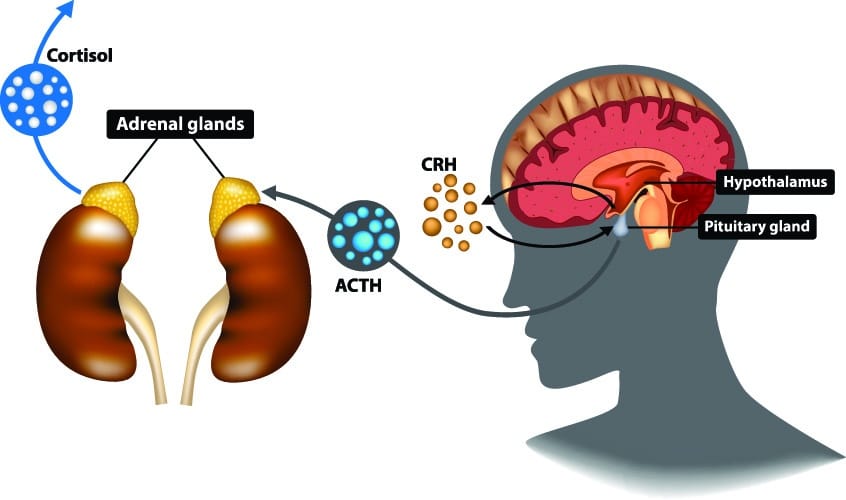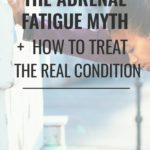This post may contain affiliate links. Please read our disclosure policy.
Is HPA axis dysfunction at the root of your symptoms? Here’s everything you need to know about HPA axis dysfunction, including symptoms, causes, and ways to heal.

You’re exhausted all day, but at night you can’t sleep. You’re relying on coffee to get you through the day, and crave carbs and sugar. You feel bloated. You don’t have the energy to do your normal exercise.
If you ask “Dr. Google” what these symptoms mean, you’ll likely find you have adrenal fatigue.
But if you ask most medical doctors, you’ll get a totally different answer: they’ll tell you adrenal fatigue isn’t real.
As it turns out, while adrenal fatigue isn’t an accurate description of what’s happening with your adrenals, the physiological changes and your symptoms are very real. What you’re actually experiencing is hypothalamic–pituitary–adrenal (HPA) axis dysfunction. While the adrenals are involved, the problem is actually upstream in the brain.
Jump to:
Adrenal Fatigue
The term adrenal fatigue has been in use in alternative medicine since the 1990s. The standard theory was that chronic activation of the stress response causes the adrenal glands to produce high levels of cortisol, which then causes the adrenals to burn out and shut down. Today, we know this theory isn’t true.
If you have symptoms of adrenal fatigue, it’s not because your adrenal glands need a nap. The adrenal glands don’t get worn out and stop producing stress hormones. In fact, research shows people who have symptoms of adrenal fatigue don’t have lower levels of cortisol than people who don’t have symptoms.
What is the Hypothalamic-Pituitary-Adrenal (HPA) Axis?

Your stress response is controlled by the Hypothalamic-Pituitary-Adrenal (HPA) Axis, which is made up of three glands that are part of the endocrine system. Here’s how they work:
- Hypothalamus: A small region in the brain that acts as your body’s smart control coordinating center. Its main function is to help your body maintain homeostasis by coordinating the actions of the autonomic nervous system and the pituitary gland. The hypothalamus secretes corticotropin-releasing hormone (CRH) to signal the pituitary gland.
- Pituitary gland: A pea-sized gland just below your hypothalamus. It’s known as the conductor of the endocrine system because it produces hormones that talk to all of the other glands in the body, including the adrenal glands. In response to the CRH, the pituitary releases ACTH to signal the adrenal glands.
- Adrenal glands: Two small glands that sit on top of your kidneys. The adrenals produce many important hormones, including cortisol, aldosterone, and adrenaline. These hormones help to manage the stress response and regulate blood sugar, blood pressure, and metabolism. In response to the ACTH, the adrenal gland secretes glucocorticoids, including cortisol.
Stress—both physical and mental—activates the HPA axis and leads to the creation of stress hormones like cortisol, norepinephrine, and adrenaline.
I like to think of the HPA axis as a big red button. Every time you encounter stress, it’s like a lever comes down and presses the button. Your hypothalamus reads the situation, and the pituitary gland tells your adrenals to begin creating cortisol and other stress hormones to help you appropriately respond to the stress.
HPA Axis Dysfunction
While the stress response initiated by the HPA axis is generally a good thing, problems can occur when the stress button is pushed over and over and over again. HPA axis dysfunction occurs when there’s a breakdown in the feedback loop of the hypothalamus, pituitary, and adrenal glands.
Similar to the story of the boy who cried wolf, when the stress button is being push repeatedly, your body stops responding to the cortisol being created. The cortisol is coursing through your body yelling “alert! alert!”, but your body has stopped listening, assessing, and responding.
The problem is not simply with the adrenal glands. It’s actually a survival response where your body 1.) becomes resistant to cortisol, and 2.) downregulates its response and communication when it comes to stress.
Symptoms
So, how do you know if this is in fact your issue? Here are the most common symptoms of HPA axis dysfunction:
- Exhaustion and fatigue
- Increased sugar and/or salt cravings
- Wired but tired at night
- Difficulty getting up in the morning
- Low appetite
- Low blood pressure
- Blood sugar spikes and crashes
- Relying on caffeine or alcohol to cope
- Brain fog
- Dizziness
- Nausea
- Lowered immune system
- Low libido
- Depression/anxiety
- Unexplained hair loss
Causes

The root cause of your HPA axis dysfunction is highly individual to you. When the overall stress your body is exposed exceeds the amount of stress your body can handle, it can result in symptoms.
Stress is physical, mental, and emotional. If you’re under a lot of stress at work, you might be able to handle it if you’re getting sufficient sleep, eating protein-rich meals, and walking out in the sunshine on your lunch break. However, it may tip the scale if you’re sleep deprived, not eating enough, and trying to do high intensity training every single morning before work.
While stress comes in many forms, the main ones include emotional stress (at home or work), lack of sleep, overexercising, undereating, undiagnosed infections, lack of support, chronic exposure to environmental toxins, food sensitivities, lack of vitamin D, an inability to cope with unmet expectations, and unresolved trauma.
Yes—all of these are chronic stressors that can cause inflammation and/or lead to dysfunction.
Testing
There’s no one definitive test for HPA axis dysfunction. But, you can have your doctor do testing to look at different aspects of the stress response, including cortisol testing. Keep in mind that research shows even people with cortisol levels that fall in the “normal” range can have symptoms.
If you do want definitive answers, working with a trusted functional medicine practitioner can help. Your doctor might also help you look at underlying sources of chronic stress, such as nutrient deficiencies, gut infections, and hormone imbalances. The good news is, treating suspected HPA axis dysregulation is very low risk and high reward. If you suspect you have dysfunction based on your symptoms and lifestyle, there are some pretty safe ways to move forward that don’t require a test.
Treatment
People with HPA axis dysfunction typically end up chasing symptoms because they never get the full picture of what’s going on. This is why looking at symptoms collectively and seeing the body through a holistic lens is so important.
Treatment shouldn’t focus on treating the adrenal glands, but instead should be about supporting a healthy stress response.
Effective treatment typically involves identifying and managing the chronic stressors in your life, learning how to cope, eating enough calories and nutrient dense foods, reducing intense exercise, supplementing with minerals through an adrenal cocktail, treating any underlying infections, supporting detoxification pathways, reducing exposure to environmental toxins, and eliminating any potentially problematic foods.
Keep in mind that there are also self imposed stressors that can tip the scale. Self-imposed ideas about how hard you need to work, how much you should weigh or exercise, how clean your house needs to be, and how much rest you need can all add to the burden on your HPA axis.
5 Ways to Treat HPA Axis Dysfunction

The internal work you’ll need to do to change how you perceive stress is the most important step to heal from adrenal fatigue. But it won’t make you feel better instantly. It takes time to break down old patterns and build new ones.
These suggestions can help you take care of your body when you’re experiencing the symptoms of HPA axis dysfunction. Ultimately, they will help you reduce stress and balance hormones naturally.
1. Ditch Restrictive Diets & Plans
Strict Paleo, The Keto Diet, and Intermittent Fasting are often just more stress to your body. Any benefits you might gain from them are outweighed by the stress you feel about “staying on the wagon.”
Instead of focusing on what you need to cut out, following rules, or counting macros, try focusing on what you can add in. Meet a minimum caloric requirement of 2,000 calories per day (as recommended in my book, Coconuts and Kettlebells). Eat plenty of nutrient-dense foods and carbohydrates that nourish your body and spirit.
2. Quit Chronic Cardio & Intense Workouts
Intense workouts can be really beneficial, and even fun. But if you’re dealing with HPA axis dysfunction, intense exercise isn’t doing your health any favors. The stress these workouts put on your body only fans the flames.
Instead of intense workouts, shift to trying more chill, restorative ways of moving your body: yoga, walking, or swimming. Yes, sometimes just resting is what you actually need! If the thought of even going for a walk is exhausting, honor your body with rest.
3. Nix Caffeine
Caffeine is a stimulant, and increases both cortisol and adrenaline at rest. When you’re struggling with HPA axis issues, your body doesn’t need more stimulation.
If you’re thinking “I can’t get through the day without coffee!”, that’s a really good sign your body is over-taxed and needs rest and care, not caffeine.
I know that just the idea of cutting out coffee can truly feel scary. You don’t need to go cold turkey. Even simply reducing the amount of caffeine you have can help, and especially nixing it past lunchtime.
4. Sleep As Much As You Can
Sleep is when your body resets and heals. Prioritizing sleep is one of the most important steps for supporting a healthy stress response and balancing hormones naturally.
Don’t drag yourself out of bed to get to the gym in the morning. And if you’re a parent, grab any chance to sleep you can. The chore or workout you were going to do while the baby napped can wait and will likely only put you further in the hole of adrenal dysfunction.
Do you wake up exhausted but can’t fall asleep at night, or fall asleep fine but wake up in the middle of the night? Those are common signs of HPA axis dysfunction. Going to sleep and getting up at a consistent time can help, as well as getting sun in the morning and avoiding screens and blue light after dark.
5. Supplements For Your Adrenals
First, I recommend incorporating an adrenal cocktail a few times a week. This is a very simple way to get in trace minerals, electrolytes, and support your adrenals.
While you likely won’t need a ton of expensive supplements to heal, there are some key nutrients that are important to supplement with to support your adrenals:
- Vitamin D + K2 – Studies suggest that vitamin D supplementation can reduce cortisol levels
- Magnesium – Stress depletes minerals, including magnesium. When stress becomes chronic, it can lead to a deficiency.
- Vitamin C – Vitamin C is a powerful antioxidant that helps your body mitigate stress, synthesize hormones, and support immune function. Your adrenal glands use vitamin C to produce stress hormones, including cortisol.
- L-Theanine – An amino acid that has been shown to reduce stress related symptoms, and promotes calmness and sleep.
You also may want to experiment with adaptogens, which are natural herbs that help your body manage stress. Adaptogens like holy basil, ashwagandha, and rhodiola have been used historically in both Chinese and Ayurvedic medicine.
Note: If you’re pregnant or breastfeeding, discuss any new supplements you plan to take with your medical provider first.
Long Term Stress Management
It’s true that almost everyone experiences some level of stress, and most of us encounter a lot of daily little stressors like traffic, bills, and sick kids. But in my experience, it’s less about the stressors we face and more about how we respond to them.
If you’re a Type-A perfectionist (full disclosure: this is my personality type), you’re more likely to have a greater stress response to these everyday stressors. With my own clients, I’ve noticed that the majority of the people with HPA axis issue are the Type-A folks who put a lot of pressure on themselves to do it all.
Moving forward, it’s important to consider what lead up to adrenal dysfunction in the first place. Do you have unrealistic expectations for yourself? Are you taking care of you? Are you training too much? Eating too little? Working too hard? Not managing stress appropriately? You can’t expect to do the same thing and get a different result.
While you may not be able to control every stressor you face on a daily basis, you can change how you respond to stress. Learning to better manage stress has been life-changing for me. I have to prioritize my foundations—sleep, eating enough, and restorative exercise—or I’ll tip the scale. I’ve completely changed how I live my life, and that’s made the biggest difference for me and my quality of life.
Yes, You Can Recover!
The name “adrenal fatigue” might not be accurate, but your symptoms are very real and they’re rooted in the HPA axis. With a better understanding of what actually causes those symptoms, there is hope for feeling better.
Where can you start asking for help?





Mary says
This information came at a great time! I’ve been struggling with high stress levels and all the above symptoms and was convinced I had adrenal fatigue! I ordered the Cortisol Manager. A couple of questions…how long does it take before you see results? What product from Four Sigmatic would you recommend to start with?
Love your podcast!
Noelle Tarr, NTP, CPT says
Hi Mary! Unfortunately, I can’t answer that. How long it takes for your adrenals to heal all really depends on how long you’ve been experiencing symptoms combined with how you approach recovery. It’s something that you’ll always be inclined to struggle with, so it really takes a complete mindset and lifestyle change. I recommend starting with Four Sigmatic Reishi Elixir.
Debra says
Is it ok to take all three of the recommended herbs together?I’ve been using the ashwagandha for about 3mos and really has been helping. I to am a Type A perfectionist. I have also developed melasma due to my hypothyroidism so can you recommend herb/supplement for it. Love your blog, thank you
Noelle Tarr, NTP, CPT says
Hi Debra! I would start with one of the supplements listed above, and test it out to see if it has any positive effects. If after a few months you don’t notice anything, move to the next. More is not necessarily better!
Heather says
Just wondering about the minimal calorie intake of 2,000 a day. As a peri-menopausal woman with severe HPA Axis dysfunction (currently working with a provider to address and heal this). I am at a place where I can not do more than yoga with out overly fatiguing myself. I loosely as aware of how many calories I eat, but I am more concerned with the quality of my nutrition. I prioritize quality meats, fruits and vegetables as well as select gf grains. I try to eat quality carbs from vegetables. Doing this I feel better. I am probably 25 pounds over ideal weight. If I were to ear 2,000 calories a day I would most definitely gain weight, however if I am not eating enough to heal I do want to address that. Any input would be appreciated.
Noelle Tarr, NTP, CPT says
Hi heather! 2,000 calories works as a minimum for most, but not all people. I would eat nourishing foods in the amount that feels right (not eating to be overstuffed). Make sure that you are supporting your body and eating sufficient calories. Focus more on reducing stress in other areas (workouts, mental/emotion stress) and of course working with your provider to look at all other possible causes.
Sunel Visser says
Two years and four months of recovery and counting, I am getting tired of counting and dying to get back into doing exercise!!!
Seara says
Hi! I’m thinking about becoming a nutritional therapy practitioner. Would you share some insights and where you went to school please?
Noelle Tarr, NTP, CPT says
Hi Seara! I just updated my post with my honest review of the nutritional therapy program + why I chose it! Here it is: Nutritional Therapy Association Review: My Honest Thoughts
Susan Scott says
Great article and really useful information
Elizabeth says
I’m completely open to my condition not being this thing we call Adrenal Fatigue (I call it HPA Axis Dysfunction) and what you say makes sense. My question is, both my saliva tests show a mess, basically a flat line all day with a small bump late morning. I’ve been doing all the things you mentioned for a year, even retired from a stressful job, so I have very little stress yet I’m still having weeks and months where I just crash. How long should healing take, IYO? Thanks!
Noelle Tarr, NTP, CPT says
Hi Elizabeth! It can take awhile—longer than you’d like. You have to consider how long you drove yourself into the hole of stress. Also make sure you are eating enough calories and supplementing with minerals regularly to support your adrenals. And adrenal cocktail daily (at 10am and 2pm) will help!
Sara says
This is such a great article! I am going through this right now and am having to take a step back to reevaluate my lifestyle and what is truly important to me. I really appreciate this straight-forward guide since most other articles I found seem dismissive, but my symptoms are very real.